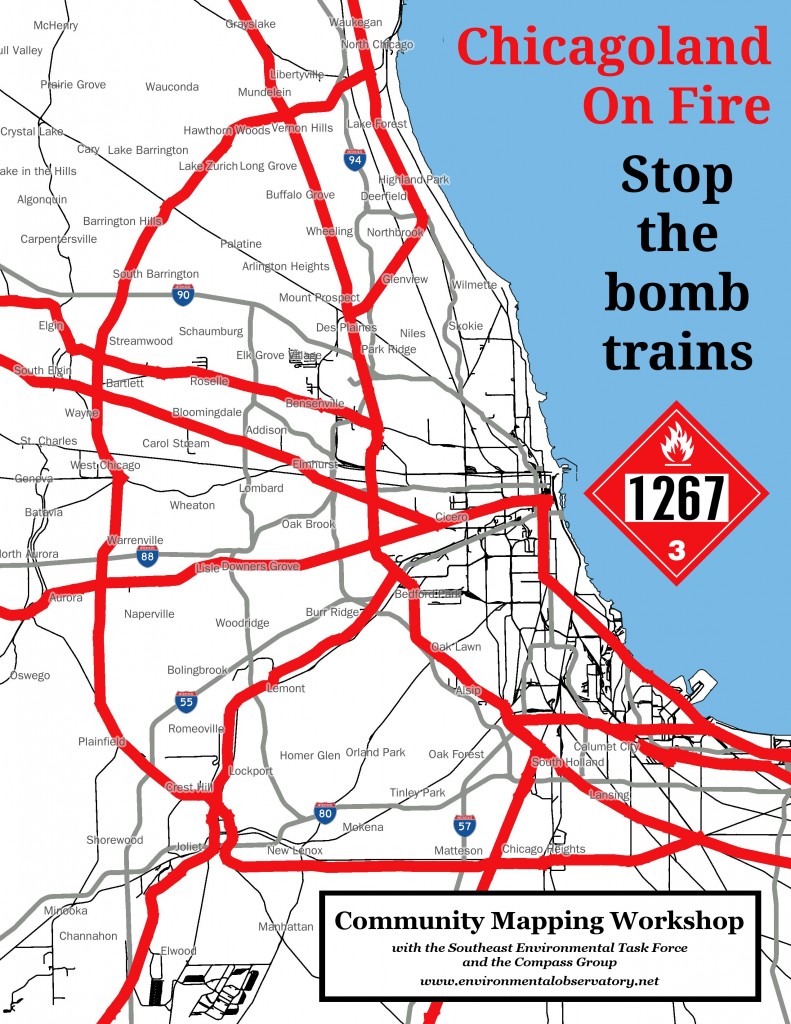Workers, Community and the Environment
 Compass members Borcila and Holmes at the conference put together by Railroad Workers United, along with Tom Shephard of Southeast Environmental Task Force and Lora Chamberlain of Chi Oil By Rail
Compass members Borcila and Holmes at the conference put together by Railroad Workers United, along with Tom Shephard of Southeast Environmental Task Force and Lora Chamberlain of Chi Oil By Rail
Extreme Energy: The Burning Issues
Chicago is the rail hub of North America: a dangerous crossroads in the age of explosive Bakken crude. Every week some forty oil trains come rolling through the city’s most populated neighborhoods, each with an average of a hundred tankers. The tankers are filled in the shale oil fields of North Dakota. They bear the red hazmat placard #1267. Maybe you’ve seen them?
Since the raging fire that destroyed the Canadian town of Lac Mégantic two years ago, we know these bomb trains are a potential catastrophe. And that’s about all we know. Proposed regulations have been gutted by industry lobbies. The explosions have continued, as nearby as Galena, Illinois. But neither the government nor the corporations will provide information about the trains, their routes or their destinations. Nor will they disclose their “worst case scenarios.” Everything that matters is kept strictly secret.
The oil trains are just one symptom of what some people call “the extreme energy economy.” In Chicagoland we directly experience the frenzied rate at which fossil fuels are extracted, transported and burned. Our region is home to three of the biggest refineries of Canadian tar sands oil — Exxon in Joliet, Citgo in Lemont, and BP in East Chicago — brought here through a series of pipeline expansions that have stealthily replaced the controversial Keystone XL. The region is crisscrossed by railcars, barges and trucks carrying petcoke, a highly carcinogenic byproduct of the tar sands oil. How can ordinary people learn to recognize and denounce these energy extremes?
Community mapping is a grassroots process that serves to gather information and to raise public awareness. It can be a tool for campaign building and a powerful argument in political negotiations. For community members it provides a way to get involved, to share information and to put one’s own experience into a bigger picture. It can also provide anonymity for those who are barred from disclosing information on hazards or abysmal working conditions. Using this process we can create a collective understanding of the problems we are facing, and develop alternate visions. To those ends, the Compass group and the Southeast Environmental Task Force have developed two grassroots mapping tools.
Trainspotting is an interactive web page for mapping oil by rail, accessible at www.environmentalobservatory.net. Here, anyone can place a flaming icon to indicate the sighting of a tanker train bearing the hazmat placard #1267. Just zoom in to the spot where you saw the train and click. A window allows you to record the details: the name on the locomotive, the number of cars, the direction of travel and the time of day. With this tool we hope to hope to confirm and/or correct the influential national map of “Oil Train Blast Zones” developed by the group Forest Ethics. Every sighting builds a more complete picture, revealing the dangers faced by workers and local communities.
Mapshop is about hands-on workshopping with large-scale custom-designed paper maps showing the highways, waterways, railroad tracks and rail yards that are an omnipresent feature of Chicago life. Using these maps and a series of prompts, groups of people can meet each other directly, exchange stories and experiences, point to specific places and ask each other questions. They can mark, trace or write on the maps to chart individual and collective understandings. The facilitators gather the information and find new graphic forms that respond more effectively to community concerns and inputs. The results are then returned to the people involved, either through a new paper map or an updated web presentation. The aim of the workshops is to increase participation, to build awareness, to create new knowledge and to use all that to push back against clear and present dangers that threaten everyone.
We’ve been inspired to do this work by a number of committed groups in the Chicago area and beyond:
Chi Oil by Rail is an advocacy group that has been holding regular meetings and protests to build alliances across the metro region and push for regulatory action. Their demands include degassifying the Bakken crude so it won’t explode, shrinking the oil trains to thirty cars or less so they’re easier to handle, maintaining a minimum two-engineer crew for each train and restoring the “right to know” for all collectivities traversed by hazardous cargo.
The Michigan Coalition against Tar Sands (MI CATS) are committed to stopping all transportation and refining of tar sands oil in the Great Lakes Basin. The Micats have been pushing for regulatory action on the aging Mackinac Straights pipelines, sustaining economic divestment campaigns that target pipeline companies and working on direct action to link fossil fuels and water health.
The Enbridge Tar Sands Resistance Tour connected First Nations struggles in Canada and Minnesota with communities across Michigan, Indiana and Illinois. More pipelines are not the solution! Thanks to these kinds of alliances, the Great Lakes are re-emerging as an area of particular vulnerability, but also a space of increasingly connected sites of resistance and pathways of solidarity.
for community mapping resources : www.environmentalobservatory.net